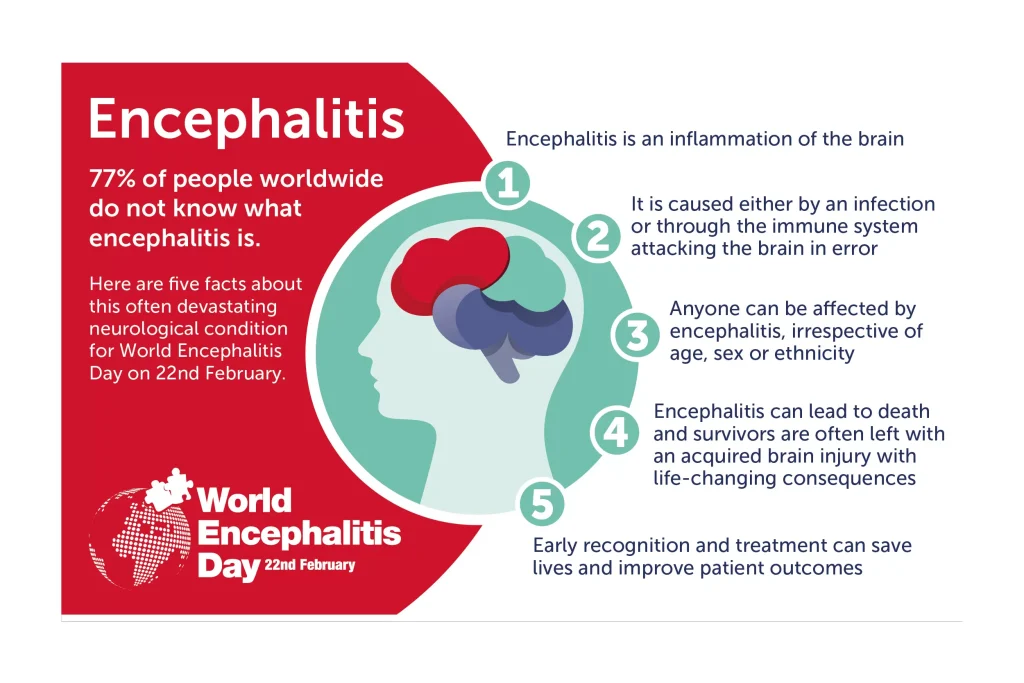Posted: 21/02/2025
World Encephalitis Day
Reading Time: 2 minutes
In 2014, Encephalitis International created World Encephalitis Day in order to raise awareness of this serious but often misunderstood condition. It is noted that even today 77% of the population still do not know what encephalitis is.
This year, World Encephalitis Day will be taking place on 22 February 2025. Every year, Encephalitis International ask their supporters to wear something red on World Encephalitis Day and then share their photos or videos on social media using the hashtag, #Red4WED.
All across the world, Encephalitis International are calling for support from all across the world by lighting up landmarks red. In 2024, 249 landmarks were involved and the hope is to beat this figure in 2025.
What is encephalitis?
This is inflammation of the brain which affects approximately 1.5 million people each year across the world and approximately 6,000 cases in the UK each year. It can be caused by an infection invading the brain (known as infectious encephalitis) or through your own immune system attacking your brain (known as post-infectious or autoimmune encephalitis).
Infectious encephalitis
The different types of infection that can cause encephalitis include:
Viral infections:
Bacteria, fungi or parasites.
The symptoms you would present with include flu-like symptoms or a headache and further symptoms can follow over a period of hours to weeks. Serious symptoms can include an alteration in consciousness leading to a coma, seizures, aversion to bright lights, inability to speak or control movements, sensory changes and neck stiffness.
Autoimmune encephalitis
This is where specific antibodies are found in an individuals blood which are normally created to fight off viruses and bacteria but attack the brain. The reason this happens is not known.
Symptoms that occur in relation to autoimmune encephalitis tend to take longer to present and can include confusion, altered personality and behaviour, psychosis, movement disorders, seizures, hallucinations, memory loss and sleep disturbance.

Diagnosis
Many of the symptoms for encephalitis are common to a variety of other illnesses / disorder and therefore diagnosis needs to be assisted by way of a lumbar puncture, scanning including CT and MRI, EEG’s, antibody screening and blood testing. Diagnosis of Encephalitis is very important because very severe cases can lead to death and acquired brain injury with life changing consequences.
Treatment
Early recognition of encephalitis is vital to ensure timely treatment, which can in turn save lives and improve the outcome. Treatment will depend on the type of encephalitis and can include:
· Antivirals or antibiotics/antifungal.
· Steroids, intravenous immunoglobulin, plasma exchange and other drugs to reduce the immune system response.
· Medicine to control temperature, discomfort and seizures.
· Induced coma – this assists with giving the brain time to recover from the swelling caused by the encephalitis.
Recovering from encephalitis can be a very long process and some people never make a full recovery. Encephalitis can cause acquired brain injury which can lead to various physical and cognitive problems leading to an individual needing long term help from family, friends and NHS/private healthcare assistance.
If you wish to be involved in World Encephalitis Day wear something red or donate to their Just Giving page: World Encephalitis Day (WED) Fund – JustGiving
FRIENDLY, EFFICIENT LEGAL ADVICE
We’re ready to chat when you are
Drop us an email or give us a call for a no obligation chat to see if we can help.
